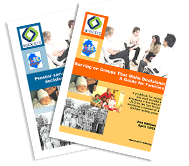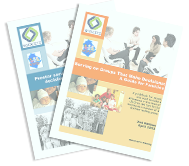The Wisconsin Early Childhood Collaborating Partners (WECCP) vision is that all children in Wisconsin will receive the necessary services and family supports to attain their optimal developmental potential during the critical early years from birth through age five. Their website has information and resources on a number of topics, such as Homelessness and Poverty, Serving Children with Disabilities, Serving Dual Language Learners, Curriculum and Assessment, and Early Identification. http://www.collaboratingpartners.com/
The National Association for the Education of Young Children (NAEYC) provides professional development opportunities and resources, sets and publicizes early childhood standards, and builds public understanding and support for developmentally-appropriate activities and services of all young children and their families. Their website has quality, evidence-based information, resources, and materials for anyone working with or is a parent of a young child.
Zero To Three is a national, nonprofit organization that informs, trains, and supports professionals, policymakers, and parents in their efforts to improve the lives of infants and toddlers. Their mission is to promote the health and development of infants and toddlers. Their website has information, materials and resources on care & education, public policy, maltreatment, and behavior & development. Little Kids, Big Questions is a series of 12 podcasts that translates the research of early childhood development into parenting practices that mothers, fathers and other caregivers can tailor to the needs of their own child and family.
The work of this foundation is to equip and train parents about the importance of social emotional growth in children beginning in utero. There are many parent modules on specific topics of interest to parents of young children including Making Connections, Why Do Children Do What They Do, Teach Me What to Do, and Promoting Social and Emotional Growth in Young Children to name just a few. Additional resources include book lists, tools for building relationships, and tools for developing behavior support plans and many more.
The Center for Early Literacy Learning (CELL) has a new website to make resources more easily available for early childhood intervention practitioners, parents, and other caregivers of children, birth to five years of age, with identified disabilities, developmental delays, and those at-risk for poor outcomes. CELL has a wide array of freely available parent and practitioner-friendly products, including: practice guides for infants, toddlers, and preschoolers; videos and podcasts; and a selection of mini posters in interactive and printable versions. CELL has also developed research syntheses and other products for researchers. To learn more about CELL's approach to early literacy learning, watch a brief video introduction to CELL.

